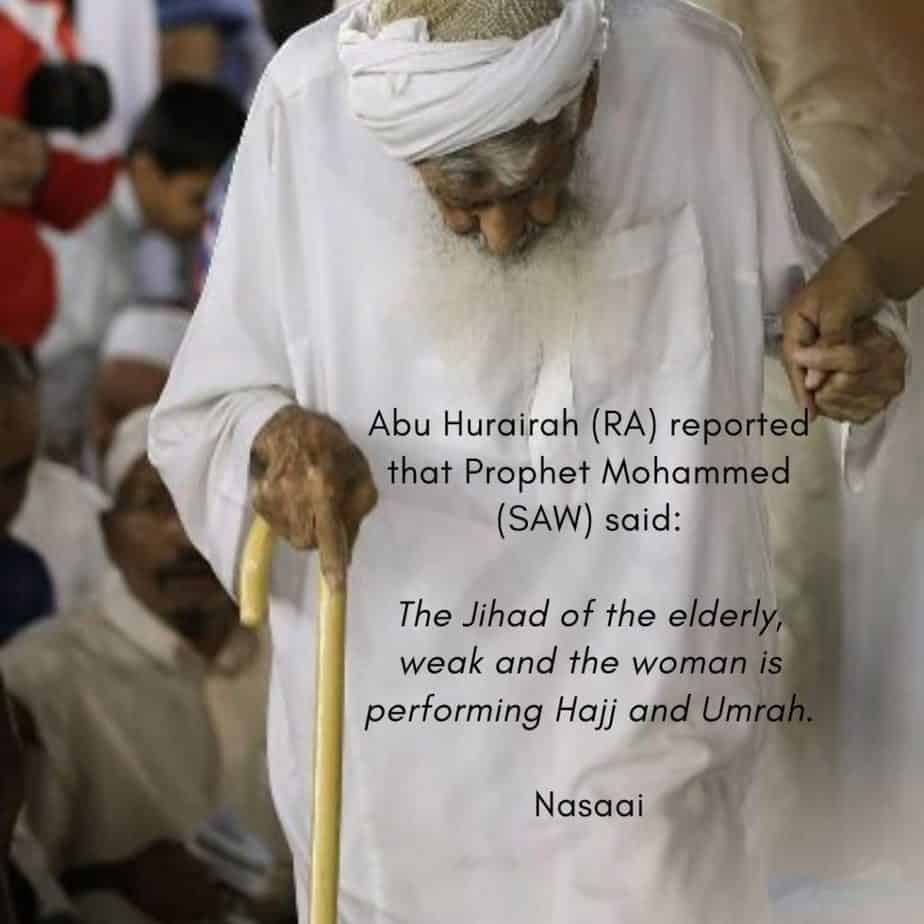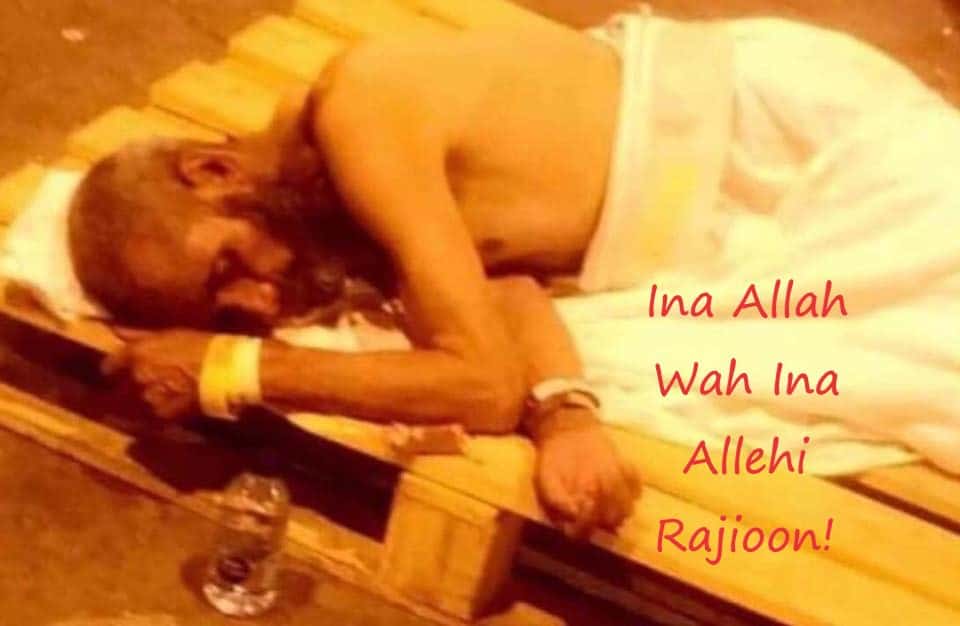Over the years, I have witnessed thousands of Muslim pilgrims (Mu’tamars) in Mecca dressed in Ihram, and with love and faith in their hearts make Tawaf
and with love and faith in their hearts make Tawaf , and perform Sa’i between Safa and Marwa
, and perform Sa’i between Safa and Marwa .
.
However, I know that few of them ever stop asking the question as to why they are really performing it-myself included. So, I decided to find out why.
So, why do Muslim pilgrims (Mu’tamars) perform Umrah?
It is a beloved Sunnah wherein as esteemed Guests of Allah (SAW) all prayers are answered, poverty is removed, wealth is multiplied and sins are expiated. It is the Jihad of the weak and elderly. Umrah in Ramadhan is rewarded like that of Hajj or doing Hajj with the Prophet himself (SAW). Those who die in Umrah won’t be judged and will directly enter paradise.
Of course, most of us know that Umrah is the lesser pilgrimage included in or made after Hajj. However, we are usually unaware of the deeper significance of performing Umrah or how it benefits us both in this life and in the hereafter.
The following article explains it all in detail. It gives the main reasons, benefits, rules, and offers hugely helpful tips for a successful Umrah based on my own personal experience and that of tens of pilgrims I have surveyed.
The goal is to inspire you and my intention is to help make your next Umrah infinitely more memorable and worthwhile.
Five Blessed Reasons Why You Should Perform Umrah
1. Umrah Is The Lesser Pilgrimage
In Islam, Umrah is known as the lesser (voluntary) pilgrimage. It is less than the (obligatory) Hajj, but no less important or significant in the spiritual lives of Muslims.
It is less because it is shorter, has fewer rituals, and is easier to perform.
Essentially, Umrah consists of:
- Ihram
- Tawaf
- Sa’i
Unlike Hajj, you can just go to perform Umrah to the House of Allah (Beit Allah) at any time.
In Umrah, consider yourself as a welcomed guest visiting a place of sanctuary, of peace, refuge, and a coveted destination most loved and cherished by the 1.9 billion Muslims the world over.
2. Umrah is Sunnah
In his lifetime, our beloved Prophet Mohammed (SAW) performed Umrah four times in the space of just three years from 629 to 632 CE. And, he (SAW) did Hajj only once in 632 CE!
Umrah to Mecca’s Beit Allah was the very first thing that Prophet Mohammed (SAW) and the other 2,000 Muslims did after they had entered Mecca for the first time following their conquest of the city in December 629 CE (7 AH).
For their first Umrah, they stayed inside Masjid Al Haram for three days. Today, when most pilgrims first enter Mecca, they barely spend two to three hours there in order to complete it.
| Rite | Month | Year | Event |
| Hajj | Dhuhul Hijah | 10 AH 632 CE | |
| 1st Umrah | Dhuhul Qai’da | 7 AH 629 CE | Hudabiyah |
| 2nd Umrah | Dhuhul Qai’da | 8 AH 630 CE | One Year later |
| 3rd Umrah | Dhuhul Qai’da | 8 AH CE 630 | After Battle of Hunnain |
| 4th Umrah | Dhuhul Hijah | 10 AH 632 CE | Wadda or Farewell Pilgrimage |
3. Umrah Is A Form of Worship
Umrah is a rite and a form of worship. It is a type of worship (Ibadah) designed to produce obedience and submission to Allah (SWT) in the hearts of pilgrims.
In Islam, worship (Ibadah) has five main expressions:
- Testimony of Faith (Shahadah)
- Prayers (Salat)
- Alms Giving (Zakat)
- Fasting (Sawm)
- Pilgrimage (Hajj & Umrah)
The above five are obligatory acts.
Also, during Umrah, you perform prayer (Salat Fard and Nafl) and as you circumambulate (Tawaf) the Kaaba you remember Allah (SWT), send greetings on Prophet Mohammed (SAW), recite verses from the Holy Quran, make supplication (Dua), and treat other pilgrims with respect and consideration.
These are forms of voluntary worship we can practice that brings us closer to Allah (SWT)
4. You Become A Guest of Allah (SWT)
From the Miqaat all the way to Mecca and during the period of Hajj and Umrah, pilgrims call out the Talbiyah to Allah (SWT).
| Arabic | Transliteration | English |
| لَبَّيْكَ اللَّهُمَّ لَبَّيْكَ، لَبَّيْكَ لاَ شَرِيْكَ لَكَ لَبَّيْكَ، إِنَّ الْحَمْدَ وَالنِّعْمَةَ لَكَ وَالْمُلْكَ لاَشَرِيْكَ لَكَ | “Labbayk Allahumma Labbayk. Labbayk La shareeka laka.Labbayk. Innal-hamda wan-n’imatalaka wal-mulk. La shareeka lak.” | Here I am at Thy service O Lord. Here I am. Here I am at Thy service Thou hast no partners. Thine alone is All Praise and All Bounty. Thine alone is Sovereignty. Thou hast no partners.” |
‘Oh, Allah I Come At Your Service!
I Am Here To Serve You
There Is Non Like You And You Have No Partners.’
Talbiyah Section (See Below)
Allah (SWT) hears the pilgrim call out to Him and responds because He (SWT) has asked you to come to his house by obliging you to perform Hajj and Umrah.
In Umrah, all your prayers, supplications and heart’s desire are answered by Allah (SWT)
5. Umrah Makes You Feel Close To Allah (SWT)
Performing Umrah makes you feel incredible. You are excited in the preparation, exhilarated in travel, and moved to tears in anticipation of arriving at the Beit Allah (SWT) to meet your Lord (SWT) and to experience the Kabba and the majestic mosque.
For Umrah, you first wash (Guhsul), make your intention (Niyah) dress in simple fresh clothes (Ihram), and respectfully enter the Haram Mosque.
As a guest entering the home of the host, Almighty Allah (SWT), you acknowledge Him in your prayers (Salat) and worship Him further by performing Tawaf and Sa’i between mounts Safa and Marwa.
At Masjid Al Haram, your initial excitement transforms into feelings awe, and the faith (Imman) builds up in your heart.
After completing Umrah, you feel clean, content, immersed, and are overwhelmed by love, closeness, and appreciation for Allah (SWT) Lord of the earth heavens and everything in between.
The closeness you feel towards Allah (SWT) in Umrah is deep and more than you could ever experience at home or in any other normal mosque.
6 Amazing Benefits For The Pilgrim In Performing Umrah
1. Umrah Removes Poverty
Muslim pilgrims performing Umrah especially if followed by Hajj are acts of worship that eliminate poverty and sin.
They remove poverty and sins from the life of the believer as the bellows and fire of the blacksmith separate the impurities from precious metals.
We understand from the above Hadith of Prophet Mohammed (SAW) that performing Umrah leads to wealth and richness.
Allah (SWT) blesses the Muslim pilgrim’s work, even enriches his soul, and strengthens his conviction to face his trials and periods when there is a lack of money and wealth.
Likewise, if he is poor, the Muslim pilgrim will feel rich and fulfilled in his being and spirit in spite of his low condition.
2. Umrah Removes All Sins
As well as removing poverty, a Muslim performing Umrah also has his/her sins removed.
If you perform Umrah and then commit sins, they will be removed the next time you perform Umrah.
And, the sins you commit thereafter will be removed each and every time you perform another Umrah. This though only refers to minor and not major sins.
3. Umrah is The Jihad for the Weak and Elderly

The old, sick, and weak cannot easily make Jihad in the way of Allah (SWT) in the sense of fighting against disbelief Al Kufr.
Prophet Mohammed (SAW) said that their Jihad is Hajj and Umrah. (See hadith above)
Jihad, however, means to fight disbelief (Kufur) or to strive to do your best in word and deed.
In a general sense, Muslims also understand the struggles in their lives as a kind of Jihad or test of faith and the soul.
Those that die fighting in Jihad, wars against the disbelievers, (Kuffar) are the martyrs (Shuhadaa). When they fall in battle, these martyrs are not washed before burial.
Those that die from illnesses, accidents, or defending their private property and wealth are also considered as martyrs. However, after their deaths, they are washed before burial.
Both types of martyr or Shuhadaa have a very high status in the hereafter second only to the Prophets of old (Al Anbiyaa) and companions and family of (Sadiqoon) of Prophet Mohammed (SAW).
After their deaths, the martyrs (Shuhadaa) these martyrs will enjoy the company of those (Al Anbiyaa/Sadiqoon and Righteous) that Allah (SWT) has blessed and favored.
We know this from the Holy Quran in which Allah (SWT) says:
وَمَن يُطِعِ ٱللَّهَ وَٱلرَّسُولَ فَأُوْلَـٰٓٮِٕكَ مَعَ ٱلَّذِينَ أَنۡعَمَ ٱللَّهُ عَلَيۡہِم مِّنَ ٱلنَّبِيِّـۧنَ وَٱلصِّدِّيقِينَ وَٱلشُّہَدَآءِ وَٱلصَّـٰلِحِينَۚ وَحَسُنَ أُوْلَـٰٓٮِٕكَ رَفِيقً۬ا
And whoever obeys Allah and the Messenger, then they will be in the company of those on whom Allah has bestowed His grace, of the Prophets, the Saddiqoon, the martyrs, and the righteous. And how excellent these companions are! (Quran 4:69)
Click here to read and hear the Verse Surat An-Nisa
The Hadith narrated by Abu Hurairah (RA) implies that since the weak, sick, and elderly are unable to fight in the way of Allah (SWT) in Jihad, the next best thing for them is to strive or make Jihad by performing Hajj or Umrah.
In Masjid Al Haram, you will see many people in wheelchairs, weak and old people performing Umrah. I often feel a sense of compassion and pity for them.
What I always forget is that if they were to die whilst in a state of Ihram, what a glorious reward would be awaiting them.
4. Umrah in Ramadhan Is Equal to The Performance Of Hajj
Muslim pilgrims across the world ache in their hearts to be able to come to Hajj at least once in their lives because, in Islam, it is obligatory to perform at least once.
They save up money for years to be able to do the trip. Today, however, making Hajj is costly and not easy since many Muslim countries operate a lottery-type system of selection (Qora).
Not every Muslim in the world is fortunate enough to get chosen to come to Hajj and in any case agency (Hamla) fees are very expensive.
There is another possibility to get the rewards of Hajj without having to perform the Hajj.
It is this:
According to our beloved Prophet Mohammed (SAW), Umrah is the same as Hajj for those who want to perform Hajj but for one reason or another are unable.
In another Hadith, an old lady called Um Maqal approached Prophet Mohammed said: ‘Oh, Messenger of Allah, I am very old and a sickly lady. Is there any action I can do which will be sufficient for my Hajj?’
Prophet Mohammed (SAW) informed her, ‘Umrah performed in the month of Ramadhan equals Hajj.’
Ramadhan is also a difficult time to come for pilgrimage due to the high demand, but it is cheaper and MUCH easier to perform than Hajj during the holy month of Ramadhan.
Scholars differ in their interpretation of the above Hadith.
- Some say it was intended ONLY for the woman from the tribe of Ansaar to whom Prophet Mohammed (SAW) had spoken the words when she was unable to perform for Hajj with her husband and son.
- Others maintain it includes anyone who makes the intention to perform Hajj, but is unable so makes it up with doing Umrah instead.
- Another opinion openly states it is intended for ANYONE who wants to do Umrah in Ramadhan, regardless of whether they had intended to do Hajj or not.
The most correct opinion is the last one and the virtue mentioned in the Hadith of Umrah performed in Ramadhan is equal to Hajj is accepted by scholars in all the four Madhabs in its general meaning. Alhamdulillah!
See the following link for a more complete discussion with rationale and proofs. What is meant by Umrah in Ramadan is equivalent to Hajj?
5. Umrah In Ramadhan Is Equal To The Performance of Hajj with the Prophet (SAW) Himself
Performing Umrah in Ramadhan is not only equal to Hajj, but it is like performing Hajj with the Prophet (SAW) himself.
If such a thing were possible, how amazing that would be?
Prophet Mohammed (SAW) made Hajj only one time in 632 CE with 3,000 Muslim men and women just after they retook Mecca from the Kuffar.
Imagine, if you can, how wonderful that would have been. And, if at some point in the future you decide to perform Umrah in Ramadhan time while you are in Masjid Al Haram, in your imagination at least, see yourself with Prophet Mohammed (SAW) and the early Muslims making Tawaf, kissing the Black Stone, performing Sa’i and enjoying drinking the blessed Zam Zam water.
6. One Who Dies in Hajj or Umrah Enters Directly Into Paradise
This Hadith above reminds me of the true story of a Pakistani gentleman who saved his money for 43 years, traveled to Mecca for Hajj, and died there in a state of Ihram after performing Hajj in 2019. (See photo below)
The story reads as follows:
‘’For 43 years and with the earnest dream to perform Hajj , this Pakistani gentleman saved his money each week from his meager wage.
After 43 years, the money required was still not enough, so he sold his family land to a friend and later worked on that land to earn his living and continue saving.
Eventually, he had gained enough money to fund his Hajj pilgrimage and left for Saudi Arabia in 2019.
After performing Hajj and still dressed in a state of Ihram, the old man lay down on his right side and suddenly died.
Though the Hajj pilgrims in the group knew his story, no one knew who his relatives were, even less how to contact them.
He had passed away alone, far from his home, family, and friends in a strange land.
Funeral prayers were offered for him in the Masjid Al Haram and he was washed and wrapped in the two-piece Hajj towels and Kaffin cloth.’’

Click To Read This Facebook Story and See The Many Tributes and Prayers For him. Man Saves Money For 43 Years To Go To Hajj and Dies In Mecca. 
Conclusion:
Look at the picture and you can see two important things. First, his hair has been shaved which means he completed his Hajj. Second, he is wearing two ID wrist bands, likely connecting him with a Hajj agency (Hamla) and so I assume that he was eventually identified. He will have been buried in a grave in Mecca.
Related Questions
What are the penalties for Umrah or Hajj violations? If you simply forget, don’t know, are forced to or you fall asleep your Umrah will not be violated. And, if the violation is for good reasons you must buy and slaughter a sheep. (Fidiyah). If you have sex, shave the head, kill animals, etc the penalty (Fidiyah) is a 3-day fast OR feed six poor people half saa` each OR slaughter a sheep and feed it to the poor.
Is it better to perform Umrah with a group or go alone? You can easily make your own Umrah arrangements such as visa, flight, hotel, and food spends, etc and still have a very successful Umrah. However, group bookings save you the hassle even though you will, of course, pay more.
Useful References and Resources
- To Make The Heart Tender (Ar-Riqaq)
 -Sunnah.com
-Sunnah.com - Hadith on Hajj: Pilgrims are special guests of Allah
 – Abu Amina Elias
– Abu Amina Elias - Rules Of Ihram
 -Hajjsafe.com
-Hajjsafe.com - Kashf Al Astar ‘an Zawa’id al-Bazzar ‘ala al-Kuttub al-Sittah-loohpress.com
- Ruling On Repeating Umrah – BinBaz.org
- Hajj and Umrah Are Sustenance-
 Nebrasselhaq.com
Nebrasselhaq.com - Hadith Narrated By Abu Hurairah
 -ahadith.co.uk
-ahadith.co.uk - Ahadith Collections By Abū Bakr Aḥmad Al Bayhaqi
 -Wikipedia
-Wikipedia - The Book of Hajj-
 Sunnah.com
Sunnah.com - Some Rulings On Jihad-
 Islam Question and Answer
Islam Question and Answer - Tafseer An Nisa
 -Recitequran.com
-Recitequran.com - Umrah In Ramadhan Explanation – Islam Question and Answer
- Umrah in Ramadhan Equal To Hajj
 Hadith – Sunnah.com
Hadith – Sunnah.com - Hadith Narrated by Aisha (RA)
 -Ahadith.co.uk
-Ahadith.co.uk - Old Man Saves Money For 43 years For Hajj And Dies In Mecca
 -Facebook
-Facebook
